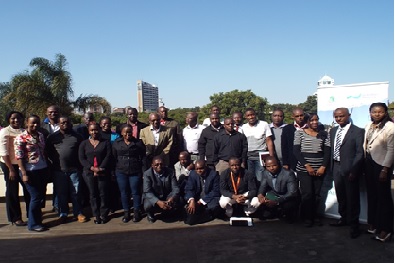In light of this, on the 5th of June 2015, a Food and Water Security Consultation workshop was held at Rainbow Towers, Harare, Zimbabwe. A total of 29 participants from the water, food, energy and finance sector attended the consultation. The value addition of this initiative lies in the establishment of a bridge between two issues frequently tackled in public policies; food security and water security.
The aim of the workshop was to mobilize the voice of stakeholders in the broader national development context on the issues related to the water-food-energy-ecosystems nexus. With the following being the main objectives: to obtain views from Zimbabwe stakeholders on the interconnections between food and water security, to build local awareness and provide inputs and options to support bilateral and multilateral negotiations, and recommendations that will enhance resolutions from the 42nd Committee of Food Security (CFS) and to ensure water and the complexity of its governance is properly reflected in any local food security agenda. The expected output of the workshop is a report with recommendations that will enhance resolutions from 42nd CFS and that will influence the global policy dialogue and contribute to shaping potential resolutions from the CFS in 2015.
In giving the welcome remarks, Mr Zvikomborero Manyangadze, Chief Hydrologist, Ministry of Environment, Water and Climate (MEWC) noted that the country has invested heavily in the construction of storage work, however significant progress in water infrastructures have not been completed due to economic challenges. As a result, from the 24th to the 26th of June, the Ministry will host the Water Infrastructure Workshop where 10 key projects will be presented to potential funders with the aim of garnering for funding. He also noted that pollution of water resources and siltation are some of the major challenges currently being faced and these need to be taken seriously to improve the country’s water security.
Mr, Wellington Dzvairo, Country Programme Manager gave an overview of the High Level Panel of Experts (HLPE) report and recommendations. In his presentation he highlighted that water is at the centre of everything and you can note separate water from the environment, since the two go hand in hand. There after a brief presentation was made on the Zimbabwe’s food and water security situation to give background information on the country’s position.
In presenting on the food security situation in Zimbabwe, Mrs, R. Nhongonhema (AGRITEX), highlighted that there had been a 49% drop from last year’s production in maize cereal (staple food). In elaborating on the food security situation in the country, Mr, W. Chaonwa, Department of Agricultural Technical and Extension Services, highlighted that 37% of the country receives adequate rainfall for crop production and hence there is potential to irrigate 220 000 hectares. Presenting on the water security situation in the country, Mr, K. Kayirasora, MEWC highlighted that water is a core development issue in Zimbabwe, central to agriculture, rural, urban and industrial development. He further noted that currently Zimbabwe has a total storage capacity of 8.7 million Mega litres from over 8 000 dams. However, he noted that there is also lack of enforcement of existing laws, harmonization of existing laws, aging and poor maintenance of infrastructure, sustainability of existing institutions, budgetary constraints, climate change and low utilization of stored water in dams which have hindered water security in the country.
Participants were then divided into three groups and had to discuss the main issues in relation to water security and energy, agriculture (food and nutrition), health and environment in Zimbabwe. Feedback from the groups was reiterated by the findings presented by the consultant, Dr Makurira who noted that with the decrease in precipitation when the demand for additional irrigation water has to be satisfied, other demands (e.g. manufacturing, industry, urban consumption, etc.) have become much more difficult to satisfy. Also climate change and increased water demand for agriculture in future decades is anticipated to be an added challenge to transboundary framework agreements, increasing the potential for conflict. Zimbabwe is vulnerable to irregular rainfall, drought and/or flooding and promotion of more drought resistant cereals like sorghum and millet would likely increase food availability nationally. The lack of a comprehensive agriculture policy framework as irrigation has declined over the past 15 years primarily due to poor maintenance or damaged infrastructure, and lack of new investment.
The consultation was a fruitful workshop that ended with Mr, W. Chaonwa acknowledging the efforts of GWP in choosing Zimbabwe to undertake the consultations as so much was learnt that could help improve the water and food security in Zimbabwe.
As Ban Kimoon puts it so eloquently, “Saving our planet, lifting people out of poverty, advancing economic growth... these are one and the same fight. We must connect the dots between climate change, water scarcity, energy shortages, global health, ecosystems and food security. Solutions to one problem must be solutions for all”.
